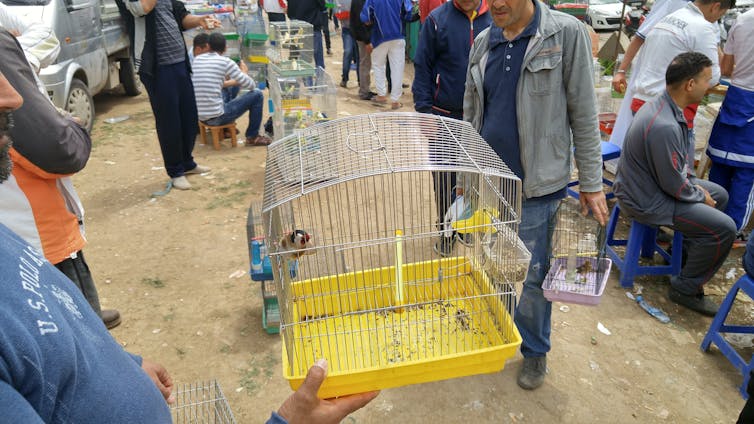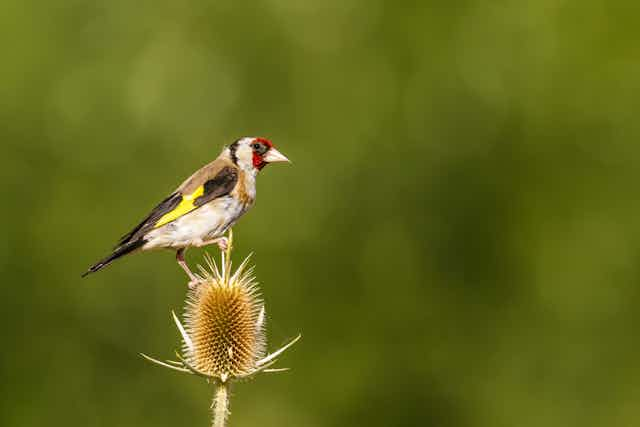Around 2.1 billion migratory birds travel back and forth every year between breeding areas in Europe and wintering ground in Africa. The migration, often referred to as Afro-Plearactic (Black Sea/Mediterranean), is one of the most important in the world. But the number of birds making the journey has been in severe decline over the past few decades.
Bird conservationists believe that illegal hunting as well as bird snatching in the Mediterranean are the main reasons for the decline. Some estimates suggest that as many as 36 million migratory birds are killed every year. Birds are hunted for food and sport and caught to be kept as pets.
To help us understand the problem, we studied the European goldfinch (Carduelis carduelia) in the western Maghreb – Tunisia, Algeria and Morocco – where one of the 14 subspecies, (C. c. parva), exists.
The European goldfinch, with its wonderful colouration and excellent melodic singing, is by far the favourite pet for people living in the western Maghreb where it’s been part of the local culture for centuries. There is also demand for them in Europe.
We set out to find out in which areas goldfinches were prevalent in the 1990s, and whether they’re still there now. We did a survey of poachers in Algeria, Tunisia and Morocco. Our analysis showed that the distribution range had retracted by 57%. Most of the extinctions were recorded in the eastern part of the region – in Tunisia and Algeria.
Such rapid extinction has rarely been seen in wild songbirds, and unless urgent conservation actions are established there’s a possibility they will disappear completely.
In decline
The European goldfinch is ubiquitous in the region. We estimate that there are about 6 million domestic goldfinches in Algeria and probably around 15 million in western Maghreb.
But these numbers are much lower, and less evenly spread out, than they were a quarter of a century ago.
Large scale poaching started in the early 1990s. Poaching goldfinch became so frequent and widespread that the kids took it up as a hobby and adults as a part-time or even full job. The species was poached and sold in the weekly flea markets with the price of a sweet. The birds were so abundant that locals had no expectations that it would go extinct.

Two decades later, the species disappeared in several localities where it used to thrive like regions in Northeast Algeria: Souk Ahras, Guelma and Annaba.
The main reason seems to be the unsustainable exploitation of the birds in the wild. We found that while goldfinches are kept in many homes, only 3% of 2721 owners we surveyed carried out in-cage breeding.
The economic value of the species has gone up so much that it’s triggered a social trend – owning a goldfinch is now a matter of prestige. Prices have increased massively during the past 26 years. On average, the price went from 1$ in the early 90s to 100$ in the last five years. That’s a third of the average person’s monthly income. There’s even an anecdote that a goldfinch that sang exceptionally beautifully was exchanged for a car.
There is evidence that a trading network has been established in the region. Due to the scarcity of goldfinches in Tunisia and Algeria, poachers have started to export the birds in their thousands from Morocco.
There have also been instances where local goldfinches have been exported illegally to Europe, particuarly France and Belgium. They fetch €1000 euros because there’s a view that that the North African subspecies of goldfinch sing better than the European subspecies.
The major threats
There are two threats that conservation authorities should be worried about.
The first is that most of the poachers we interviewed used mist nets, a net made of fine threads and placed vertically like a volleyball net to capture birds. Using mist nets means that other species, known as by-catches, are also caught. This is a major threat to a range of bird species because the Western Maghreb is an important stop-over site for migrating birds from Europe.
In Northeast Algeria we recorded 16 species that had been caught as by-catch, of which five were migratory. Since the use of mist nets is widespread in western Maghreb, we expect that the number of species intercepted every year is likely to be much higher.
The use of mist nets on a greater scale has been recorded in neighbouring countries such as Libya and Egypt or even Cyprus where millions of birds are intercepted every year. Although the fate of those species caught in by-catches is still unknown (released, eaten or traded), studies have shown that mist nets can cause injuries and mortality.
The second major problem is that the array of wild bird species for sale in markets in the region seems to be on the rise. For example, we found one migratory species, the Eurasian siskin, regularly sold in the market in Northeast Algeria.
The use of mist nets might be the reason for this. Poachers are selling other species as substitutes for the rare and expensive goldfinch.
What can be done
Authorities should intervene immediately to stop the illegal poaching. Failure to do so will result in the continued exploitation of both goldfinches as well as other local and migratory songbirds.
And local people need to be sensitised to the ecological consequences of species extinction and its potential effects on the local economy and human health.
Artificial breeding should also be encouraged. This offers a self-sustaining solution because goldfinches have large clutch sizes, high brood production as well as long lifespans.
The rapid extinction of several populations of the goldfinch in the western Maghreb must be a lesson for people and conservation authorities across the world – even abundant species can disappear over a short period of time from over exploitation.

